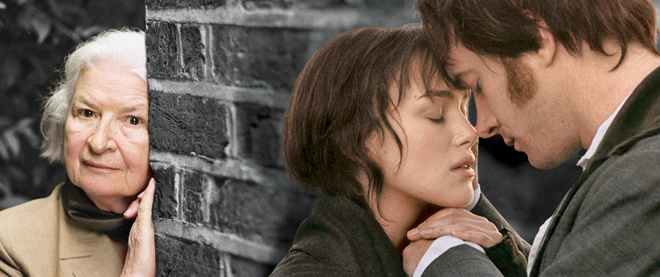P.D. James enters the Austenverse
The grande dame of mystery adds her own twist to the classic pride and prejudice
David Harrison/Redux, Alex Baily /CP; Photo Illustration by Lauren Cattermole
Share

“Did you know there were about 70 of them?” asks P.D. James, a note of wonder still in her voice. “And some of them so extraordinary—zombies and sexual obsessions.” The grande dame of classical British mystery novels, now 91 and still hard at work, is talking about sequels to one of the best-loved novels in English literature, Jane Austen’s Pride and Prejudice, published in 1813. Baroness James of Holland Park had decided, as she was turning 90, that perhaps she shouldn’t embark on any projects as lengthy as another novel of Scotland Yard detective Adam Dalgliesh, and her thoughts turned to some unfinished business she had with Pride and Prejudice. “Austen is absolutely my favourite novelist,” says James, “Emma is my favourite book—I think it’s a perfect novel—but I’ve always wondered about Darcy’s emotional reactions. I thought I’d write a story working through that, and then I thought I’d better have a look at who else might have done that.”
And so James encountered the Austenverse, as it’s become known. Beyond Bridget Jones’s Diary, Bollywood’s Bride and Prejudice and the nine more or less straight-up film adaptations of Austen’s novel, there is an entire fictional sub-genre of unhappy modern women obsessing over the author’s placid rural world. Sometimes the women in those stories play out their dreams in an Austen-esque way, or even end up in Austen-era England. In one 2008 BBC miniseries, Lost in Austen, a 21st-century Londoner switches places with heroine Elizabeth Bennet—that is, with a figment of Austen’s imagination—and proceeds to wreak romantic havoc in the setting of Pride and Prejudice.
James being James, her entry was always going to be different, and right from its title: Death Comes to Pemberley might as well have been called Death Comes to Eden. Aside from its zombie-killing corner, the Austenverse is a happy land where really bad things, like violent death, just don’t happen. The story opens in 1803, six years after the original was written, long enough for Elizabeth and Darcy to have had two sons and settle into his ancestral home of Pemberley. It’s the evening before the annual ball and there is unspoken tension in the perfect family. Matters worsen as a carriage careens up to the house and wayward sister Lydia tumbles out, screaming that her husband Wickham has been killed.
It may come as a disappointment to Austen fans who despise Pride and Prejudice’s chief cad, but it soon turns out that Wickham, far from being the victim, seems to be the murderer. That won’t surprise James’s fans. Killing him off was tempting, “but I didn’t want to be that obvious,” says the author. The rest of the tale—including the investigation, as forensic as possible in 1803, the trial and the restoration of Austenverse harmony—allows James the fan to “indulge herself” making references to characters from other Austen novels. The Knightleys (Emma) live in the neighbourhood, while Wickham, hilariously, has been behaving badly in the household of Sir Walter Elliot, the vain and profoundly stupid patriarch of Persuasion. James also turns her shrewd eye away from standard Austen territory and toward the lives of the servants and the workings of larger social forces. (Austen is famous—or notorious, depending on perspective—for never mentioning the Napoleonic wars in her novels, despite having lived through them.) Primarily, though, Death Comes to Pemberley permits James to work out that decades-old Darcy problem.
James had always found him mysterious: “How appalling that first proposal to Elizabeth was—a proposal no gentleman should ever have offered—and then how different his second one. The explanation would have to lie in aspects of his past that Austen didn’t discuss. So I wrote this—typical P.D. James, I suppose, the way the past erupts into the beautiful, orderly, peaceful present—to get at Darcy’s inner life.” Although James offers an apology to Austen’s shade for introducing such “odious” events to Pemberley, it hardly seems necessary. The notion of Wickham encountering Sir Walter alone redeems any affront. And besides, what’s a mere murder compared to zombies?